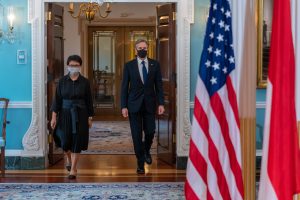Earlier this week, Indonesia and the United States launched a “strategic dialogue” that will see the two nations commit to working more closely together on issues that include the COVID-19 pandemic, climate change, and maritime security in the South China Sea.
The announcement was made on Tuesday in Washington, D.C., during a five-day visit by Indonesian Foreign Minister Retno Marsudi, which took place concurrently with the raft of meetings surrounding this week’s virtual ASEAN Foreign Ministers’ Meeting.
According to a State Department statement, Retno and U.S. Secretary of State Antony Blinken “emphasized the growing importance of the U.S.-Indonesia Strategic Partnership and its contribution to a secure and prosperous Indo-Pacific.” It described the two nations’ partnership as being based on “a fundamental belief in democracy, economic growth driven by innovation, and a rules-based international order” – all three of which can be taken as code for a common concern about the growing power of China.
The announcement breathes new life into the “strategic partnership” that was agreed between Jakarta and Washington in 2015, but which then went into hibernation during the Trump administration. (In his joint press conference with Retno, Blinken described the dialogue as “something that was agreed upon some years ago but that we are now actually initiating and launching.”)
“As the largest democracy country in Southeast Asia, as the largest economy in Southeast Asia, the strong partnership between Indonesia and the U.S. will be a key asset for your increasing engagement in the region,” Retno said during the joint press conference.
In addition to inaugurating the dialogue, the pair committed to work together to combat the COVID-19 pandemic, the climate crisis, and to boost bilateral trade and economic ties.
On Monday, Retno also met National Security Adviser Jake Sullivan, who said that the U.S. would provide an additional $30 million to help in the fight against COVID-19, which yesterday claimed its 100,000th Indonesian victim, bringing total U.S. assistance to Indonesia since the start of the pandemic to more than $65 million. Washington has also donated 8 million doses of the Moderna vaccine to the Indonesian government.
Retno’s visit, and the pending strategic dialogue, underscores the countries’ determination to enhance their already close ties. Despite the fact that U.S. Secretary of Defense Lloyd Austin did not stop in Indonesia during his recent swing through Southeast Asia – a move that the Jakarta Post described as a “snub” and “an embarrassment for Indonesia” in an editorial on Tuesday – the two nations’ security relations have grown apace in recent years.
The announcement came as more than 4,500 military personnel from Indonesia and the U.S. were taking part in Garuda Shield, a two-week joint military exercise. The exercise has been held since 2009, but this year’s edition, which runs from August 1-14, is the largest iteration of the event to date. In late June, the two nations broke ground on a new $3.5 million maritime training center on the island of Batam, at the southern entrance to the strategic and congested Straits of Malacca.
The overlapping interests between Indonesia and the U.S. are obvious. While Jakarta is not a formal legal claimant in the South China Sea, some of its waters lie on the wrong side of Beijing’s “nine-dash line,” and the two nations have engaged in a string of stand-offs over the past five years. A close partnership with the U.S., which has officially rejected China’s expansive claims to the South China Sea, is thus crucial to Indonesia’s goal of bolstering its maritime security capacity.
However, that doesn’t preclude fruitful economic relations with China, Indonesia’s largest trade partner and second-largest foreign investor last year. Despite recent tensions around the Natuna Islands in the South China Sea, security relations are in relatively good shape. In May, the Indonesian and Chinese navies held a joint military exercise of their own in the waters off Java, aimed at improving coordination during emergencies at sea. This came after China offered Indonesia its help in recovering the Indonesian submarine KRI Nanggala after its sinking in April.
Despite its steps in the direction of Washington, Indonesia can be expected to maintain a customary sense of equidistance between the two superpowers – at least for as long as it is able.

































